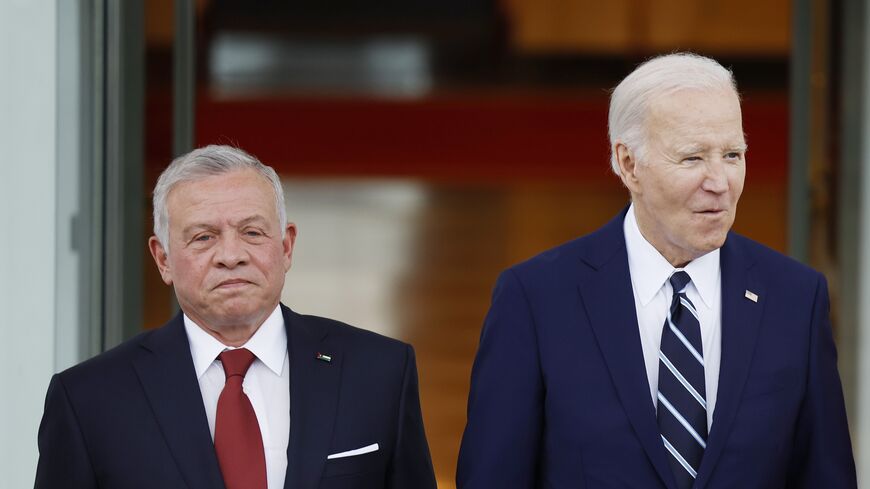US President Joe Biden rejected any forced displacement of the Palestinians in Gaza on Monday, as he hosted King Abdullah II of Jordan who warned that an Israeli assault in Rafah could unleash a humanitarian catastrophe.
King Abdullah arrived in Washington on Monday for talks with Biden and other US officials. The visit is the first by an Arab leader to the White House since the start of the Israel-Hamas war on Oct. 7, 2023.
Biden addressed the looming Israeli ground offensive in Rafah, saying that Israel should not proceed without a “credible” plan to protect civilians there.
“Many people there have been displaced, displaced multiple times, fleeing the violence to the north, and now they're packed into Rafah, exposed and vulnerable; they need to be protected,” Biden said. "We oppose any forced displacement of Palestinians from Gaza.”
King Abdullah voiced similar concerns, saying an Israeli attack on the area would lead to a “catastrophe.”
“We cannot afford an Israeli attack on Rafah. It is certain to produce another humanitarian catastrophe. The situation is already unbearable for over a million people who have been pushed into Rafah since the war started,” he said.
Rafah is currently hosting the majority of the 1.7 million displaced Palestinians in Gaza, according to a Monday update from the United Nations Office for the Coordination of Humanitarian Affairs. People fled to the area, located on the border with Egypt, due to Israeli military operations further north.
Israel has been conducting airstrikes in Rafah targeting Hamas in recent days and is expected to begin major ground operations. On Monday, the Israeli military rescued two hostages from Rafah.
Biden mourned the Palestinian loss of life in the conflict, saying “too many” Palestinian civilians have been killed, and said he discussed with the king ways to get more aid into Gaza. On the possibility of a cease-fire deal that's being negotiated by Egypt and Qatar with the help of Washington, Biden said that “key elements of the deal are on the table” but there are “gaps that remain.” The current plan is a hostage deal that would bring at least six weeks of calm to Gaza.
Biden also called for the Palestinian Authority to reform and said he welcomes the end of Hamas rule in Gaza.
"The Palestinian Authority must urgently reform so it can effectively deliver to the Palestinian people in both the West Bank and Gaza. Once Hamas’ control of Gaza is over, they must prepare to build a state that accepts peace (and) does not harbor terrorist groups like Hamas and Islamic Jihad,” he said.
For his part, King Abdullah repeated his calls for a cease-fire and a two-state solution. He described the Gaza conflict as “one of the most devastating wars in recent history,” while also condemning Hamas’ Oct. 7 attack on Israel.
“All attacks against innocent civilians, women and children, including those of Oct. 7, cannot be accepted by any Muslim,” he said.
The king additionally defended the United Nations Relief and Works Agency for Palestinian Refugees (UNRWA) amid Israeli allegations that it has ties to Hamas.
“It is imperative that UNRWA continues to receive the support it needs to carry out its mandate,” said King Abdullah.
More than 27,500 Palestinians have been killed in Gaza since the war began, most of them civilians, according to the Health Ministry in the Hamas-run enclave. Hamas' Oct. 7 attack on southern Israel that sparked the war killed around 1,200 people, also mostly civilians, while the group took more than 240 people hostage, per the Israeli government.
Why it matters: King Abdullah’s visit to Washington comes at a crucial time for Jordan and its relationship with the United States. The Hashemite Kingdom is seen as Washington's closest partner in the Arab world, but the relationship is being tested following the war in Gaza. The monarchy is grappling with the possibility of a new refugee crisis from the Palestinian territories as well as rising support for Hamas in Jordan, Elizabeth Hagedorn wrote for Al-Monitor on Monday.
The king’s trip to Washington is his first since the Israel-Hamas war began last October and the first since three US soldiers were killed in Jordan late last month. The United States blamed Iran-backed militias in Iraq for their death and has struck said groups since then, further inflaming tensions in the region.
The Biden administration has become more publicly critical of the Israeli military campaign in Gaza in recent days. Last week, Biden called Israel’s military response to Hamas “over the top” during a press conference.
On Sunday, Biden held a call with Israeli Prime Minister Benjamin Netanyahu. During the call, the president said Israel’s planned invasion of Rafah in southern Gaza should not proceed without a plan to protect civilians there.
Know more: King Abdullah will next travel to Canada to meet Prime Minister Justin Trudeau on Wednesday. From there, he will fly to France and hold talks with French President Emmanuel Macron. The king will end his international trip at the Munich Security Conference in Germany, according to a statement from the Royal Hashemite Court.



